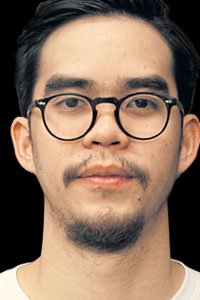Actress Ornanong Thaisriwong slowly opened the louvre windows and shouted out the following questions and statements, in different voices, to an empty balcony on the fourth floor of Thonglor Art Space.
"Hey, how are you?"
"I thought they weren't gonna bring you here. I've been waiting for you since morning."
"Why should I pity you? You did it to yourself; you are evil!"
"Have you changed your religion?"
"What's the most valuable thing in your life right now?"
"No, they won't give you bail."
Then she went and sat outside on a chair. Filtering through the cracks in the windows, light from inside the theatre space projected light and shadow strips upon her. We realised that she had taken on the role of someone behind bars. She answered back:
"Yeah, I'm OK."
"Yes, I understand. I don't feel slighted; coming here must make them feel uncomfortable."
"No, actually, I'm not OK."
"The only thing the majority of people agree on is pointing the finger at those who think differently from themselves."
"Why do I allow myself to feel like this? Because I'm afraid that I won't be alive the day they let me out."
The balcony couldn't be more than 5m wide, yet Ornanong seemed a world away from her audience. The background sounds of BTS trains passing by and the bustle of people on the streets made the character she was portraying even more insignificant.
The performance, a restaging from two years ago, is Bang-La-Merd. Through a mix of monologues, physical movements and site-specific set-ups, the work boldly speaks about freedom, rights violations and, more simply, human compassion. This version in particular touched on the fate of university students Patiwat Saraiyaem and Pornthip Munkong, who were last year charged with lese majeste over the play Jaosao Mapa (The Wolf Bride).
At the premiere of the performance on Thursday, I sat next to three military officers who had come to "observe" the show, recording everything with a camera. Admittedly, attending the show at all was at first appealing to me because of the rumours that there might be undercover military officers among us. I also attended a press preview on Tuesday, but they didn't show up. On Thursday, my wish was granted.
Despite the military's presence, Ornanong defiantly began with her original version of a re-enactment of a telephone conversation with a military officer. It was really funny and the audience burst out laughing. With them there, it was the best joke Ornanong could have come up with. They came to the theatre for intimidation purposes, but remained throughout the show as supporting clowns.
As the show continued, however, I felt Ornanong had managed to blur a sense of separation between the watchful officers and the general audience. She asked her audience to participate by smiling the "Siamese smile". She later smiled herself and that turned into a grotesque facial contortion before she collapsed, paralysed on the ground.
She then entered another phase of her show, dragging a chair around the room and out to the balcony, performing the repeated movement of a suppressed soul trying to rid itself of invisible shackles. The theatre's ceiling was filled with hanging razor blades. She later took out a ladder and tried to climb her way through. During the climb, her words were repeatedly blocked, as if by fear or hesitation.
In art, there's a huge difference between sneaking your way through with trickiness and telling the truth head-on. The officers in the theatre were suddenly no longer her enemies; the audience was forced to witness human experience and suffering from the same point of view.
Near the end of the performance, Ornanong asked an empty chair, which sat on the balcony: "Do you want to say anything to the person who's responsible for your being here?"
Rendered by art, such personal experience was suddenly neutral, fluid and universal. It was specific and unspecific at the same time.
Ornanong's Bang-La-Merd, in essence, was simply compassion from one human being to another. When the performance ended, with the lights on, I witnessed more than a few people sobbing. But I didn't. That fact still disturbs me. I'm sad and mad at myself for having just started to feel so much about the issue after all these years.
What's even sadder is that the military will now come to observe every performance of Bang-La-Merd. We've actually come to the point where an honest act of compassion is being viewed with suspecting and accusing eyes. And they are not even paying for the tickets.
Kaona Pongpipat is a writer for the Life section of the Bangkok Post.
